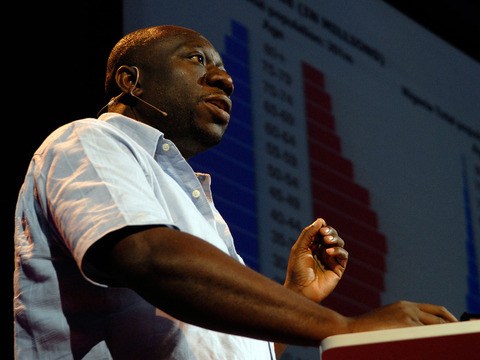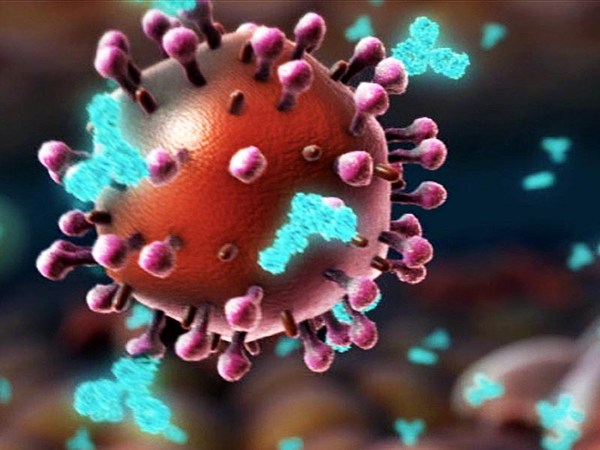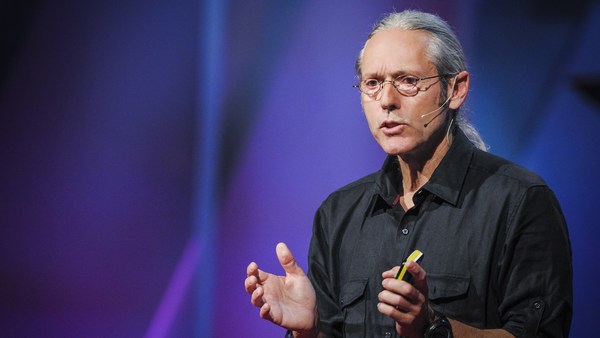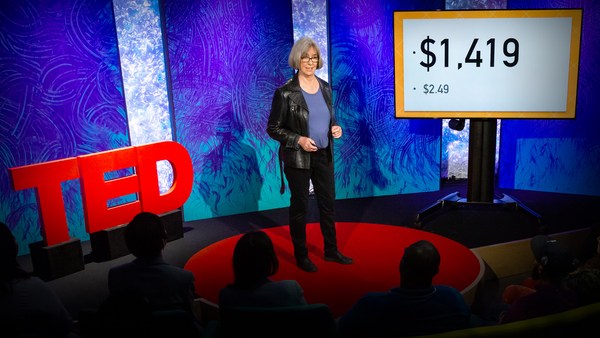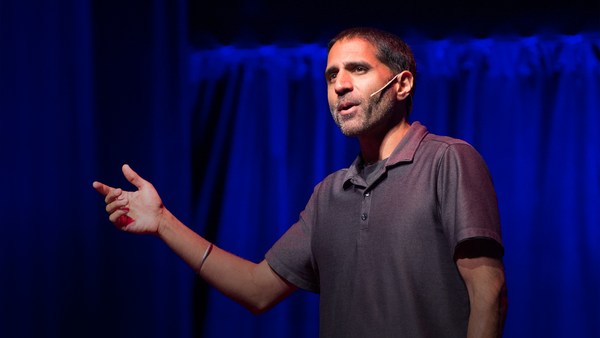I hope you're all healthy, and I hope we will all remain healthy for the indefinite future. But that hope is a little bit unrealistic, and so I've got a second back-up hope. The second back-up hope is that, insofar as we have health problems, we will have good medicines to take care of them. Medicines are very cheap to produce and they're very effective -- much more pleasant, actually, than the alternatives: hospitalization, operations, emergency rooms, the morgue ... None of these are good things. So we should be very grateful that we have pharmacologists around, people who research these things and develop new medicines. And we should be grateful that we have a pharmaceutical industry that supports their activities. But there is a problem, and you can tell from the fact that the pharmaceutical industry isn't well-loved. In fact, in terms of popularity, they rank just about with the tobacco companies and the arms manufacturers.
So that's the problem I want to talk with you about today. How would you organize the pharmaceutical industry? If we did it all over again, how would you do it? I think we would think of three main principles. The first one is: we want patients to have access to all the important medicines. Remember, these things are very cheap to produce. So everybody in the world should have access to all the important medicines. Secondly, we want innovative activities, the research and development that pharmaceutical companies do, to track the diseases that are the most important, the most damaging. We want them to aim for the greatest health impact. And thirdly, we want the whole system to be efficient. We want as little of the money that goes into the system to go to waste, to go for overhead, for red tape, and so on and so forth. Very simple three points.
Now what about the existing system? I think it does poorly on all these three counts. First, universal access: forget about it. The vast majority of human beings do not have access to medicines, at least while they're still under patent. There are extremely high markups, and that's the problem. The problem is that even though these medicines are very cheap to produce, they cost a great amount of money during the time that they're under patent, and the reason for that is that rich people can pay a lot of money. Pharmaceutical companies have a temporary monopoly; they price for the rich, they forget about the poor.
The second problem is innovation. Again, we don't focus on the diseases that do the most damage, and that's often put into the phrase "the 10/90 gap." Ten percent of all the money spent on pharmaceutical research is focusing on diseases that account for ninety percent of the global burden of disease. And vice versa -- ninety percent of the money is spent on diseases that account for only ten percent of the global burden of disease. So there's a huge mismatch between where we spend the research money and where the greatest problems are.
Now, both these problems -- the problem with innovation and the problem with access -- have to do with this: the distribution of money in the world. It's extremely unequal. The blue area here is the top quarter of the human population. They have more than ninety percent of the global household income. The bottom half of humanity, on the other hand, has not even three percent of global household income. So if you're a pharmaceutical company and you look for profit opportunities, you look at this sort of chart and say, "Where's the money? What am I going to research? Who am I going to provide with medicines?" And again, that is in the context of there being only one way in which pharmaceutical companies make money under the present system, that is, through patent-protected markups. That's how they make their money, through markups. And if you make money through markups, then obviously, you will go to where the people have the most income.
Now in terms of overall efficiency, the system also does very, very poorly. A lot of money goes for lobbying politicians in order to extend patent periods -- to "evergreen," as it's called. Data exclusivity and so on. A lot of money goes for gaming, where brand-name companies pay generic companies to delay entry, for example. A lot of money goes to take our patents in all the different jurisdictions. Money goes – even larger amounts – for litigation. They're litigating endlessly -- brand-name company against brand-name company, brand-name company against generic company ... Enormous amounts go there. People say pharmaceutical companies make a lot of profit. Well, yes and no; they do, but a lot of it goes to these wasteful activities. Deadweight losses -- I won't even tell you what they are, because it's too complicated. But there's also wasteful marketing. A lot of the money that pharmaceutical companies make goes into advertising campaigns, trying to win favor with doctors, trying to persuade patients to try this medicine. And these marketing battles, of course, are a pure waste, because what one company spends to get patients over to their drug, another company spends to win them back.
And then there is counterfeiting in the developing countries. A lot of the drugs there, often more than fifty percent of what's sold, are counterfeit drugs, where people say, "Because the drug is so expensive, I can offer you a cheaper version." But of course it's not the real thing, it's either diluted or it's completely inert. So on the whole, all the money that is spent on pharmaceuticals -- and it's roughly a trillion dollars now, per annum -- much of that money is absolutely going to waste, it's not going to where it should be going, namely, to the development of new medicines and to the manufacturing of ones that we already have.
Now, many people think that the solution to the problem is moral pressure on pharmaceutical companies. And, sure -- pharmaceutical companies have moral obligations, just like we do. When we have to make a choice, often between having a little extra money and saving a human life, we often feel that we have a duty to spend the money and save the life. And why should pharmaceutical companies be any different? But really, it isn't realistic to expect pharmaceutical companies to act as well as you or maybe I might act. And the reason is threefold. One is that pharmaceutical companies are bound to their shareholders. The executive of such a company wouldn't last very long if he gave a lot of money away, or she, for good purposes, and thereby lost money for the shareholders. They would be replaced. Also, pharmaceutical companies stand in fierce competition with one another, and if you do more, if you are nicer than the other company, sooner or later, you'll be driven out of the market. You will not survive. The other company will gain market share. And finally, remember -- the entire industry is dependent for its income on one thing and one thing only: markups. And ultimately, you have to be sustainable. If you spend a lot of money on helping poor people and you don't get paid for it, and you lose this money; you cannot continue with your innovative activities. So for these reasons, it's just unrealistic to expect that pharmaceutical companies will solve the problem on moral grounds.
Who, then, should solve the problem? I suggest it has to be us. We, citizens and politicians, have to do better in terms of regulating the pharmaceutical industry, focusing them, giving them the right incentives, focusing them on the problems that really matter. The potential gains here are enormous. About one third of all deaths each day, each year, are due to the diseases of poverty in the developing world. Fifty thousand people every day die prematurely from these diseases. And that's not even counting all the diseases that we know only too well in the rich countries: cancer, heart disease and so on. Again, poor people die often much earlier, because they don't have good medical care, including good medicines. And even in rich countries, many patients are not getting the best medicine. That's sometimes due to the fact that insurance companies won't cover it, because the price is so absolutely ridiculous. And it's also due, sometimes, to the fact that doctors and patients are falsely influenced by advertising campaigns of pharmaceutical companies.
So what can we do? How can we change the system? I want to show you a way in which we can better incentivize pharmaceutical innovation and the provision [of] medicines to poor people and rich alike. And that is the Health Impact Fund. The Health Impact Fund is basically opening up the second track with which pharmaceutical innovators can be rewarded for their activities. They have a choice. They can either go with the old system, with patent-protected markups, or they can go with the new system, being rewarded on the basis of the health impact of the medicines that they develop. And with each particular medicine, they have their choice. So they can be partly on one track, partly on the other, with different products.
Now, how would the Health Impact Fund work? There would be a fixed reward pool every year. We start with maybe six billion dollars, but that can eventually be revved up. Remember that the total money that the world spends on pharmaceuticals is a trillion. So it's a thousand billion; six billion is a drop in the bucket. It's relatively small, but it would work with six billion, and we'd get a lot of bang for the buck if we introduced the Health Impact Fund with just six billion dollars. If you have a product and you want to register it with the Health Impact Fund, you will be rewarded for a period of 10 years. During these 10 years, you get a share of these annual reward pools. That share would be proportional to your share of the health impact achieved by all these registered products. So if your product accounts for eight percent of the health impact of all the registered products, you get eight percent of the reward money that year. That repeats for 10 years, and at the end of the 10 years, your product goes generic, so you basically lose any further income from it. Each year, the health impact from your product would be evaluated, and you would be paid on that basis.
Now, if you take that reward from the Health Impact Fund, you can't claim the other reward, you can't mark up the price. You have to sell at cost. What does that mean? Well, it doesn't mean that the pharmaceutical company tells us what their cost is; but rather, our preferred way of determining what the real cost is of making a medicine, of manufacturing it, is to ask the registrant to put the production of the medicine out for tender, let generic companies compete for the production, and then the innovator would buy the product from the cheapest supplier and would sell it at that same lowest possible price to patients. So the innovator would make no money at all on selling the product, but would make all its money from the health impact rewards.
Now, how do we assess the impact of the introduction of a medicine? Well, we assess it relative to the preceding state of the art. So some people, before the medicine came along, had no treatment at all. Now for the first time, they have treatment, because it's cheap; people can afford it. So here, the impact is the difference between being treated and not being treated. In other cases, the new product is better than the old products, and so a person gets switched over to a better product, and we pay for the impact, for the difference the new product makes. If you have a product on the Health Impact Fund and you simply switch somebody from an existing product to another product, to your product, and it's no better, you get no money.
That's in stark contrast to the existing system, where you get a lot of money for switching somebody from one product to an equal product that is your product. The Health Impact Fund does not pay for that. We quantify health impact in terms of quality-adjusted life years. That method has been around for about 20 years, and it's very easy to explain. Just think of a human life as a kind of plank. It's eighty inches long, one inch high. And when you die prematurely before you reach 80, well, the plank is a little shorter. And if you're sick during the time that you live, the plank is a little bit thinner. And what diseases can nibble away, medicines can restore, or medicines can avert the taking away of these parts. And they get paid for that. That's the method, basically.
Now, we look – of course, each year, we have to assess. We have to spend a considerable amount of money looking at how these various medicines that are registered with the Health Impact Fund are doing in various countries. And here, statistics is extremely helpful. You all know how exit polling works. This is a similar method. You look for a statistically significant sample, and then try to figure out what the health impact of the medicine is in different locations, in different demographic groups ... And, of course, you look very carefully at the actual world -- this is in contrast to how medicines are today rewarded. Sometimes, there is a reward based on performance, but it's the performance in clinical trials, in the laboratory, if you like, and not the performance in the real world. The Health Impact Fund would look at real-world impact. It would look not just at the quality of a drug, but also at how widely it is distributed, whether the innovator manages to target those patients who can benefit the most, and also, how well the drug is used in the field. So innovators would have much stronger incentives than they do now to make sure that every patient who takes the drug knows exactly how to take it to optimal effect. Today, most packaged inserts are not even translated into local languages, and so it's not surprising that patients don't make the best use of the product.
Now, how would the financing work? Basically, the Health Impact Fund, as I said, could start with something like six billion dollars. It's not nothing, but it's also not a lot of money, compared to what the world is already spending on pharmaceuticals. So the best way to think of it is as a new way of paying for what we are already paying for, namely, new medicines. You pay with one hand through the tax system, but you get something back with the other hand, because you also get these medicines for cheap. This is not just for poor people -- everybody will have these Health Impact Fund registered medicines at cost, at a very low price.
One very important hurdle here, politically, is that we have to make sure that we have long-term visibility for innovators, that innovators know that the money is actually there, and so we need governments to fund the Health Impact Fund, because only governments can make predictable commitments for a long period of time. Because the Health Impact Fund registration is voluntary, you basically have a self-adjusting reward rate. As the rate rises too high, innovators will come in and drive the rate down. Conversely, if the rate falls too low, innovators would be reluctant to register, and the rate will recover. So the rate will always be at a reasonable level.
The Health Impact Fund is beneficial for all parties. It benefits innovators by giving them a new market, and most importantly, by overcoming their public relations problems that we started with. It benefits patients, because patients are much more likely to get the right medicine, and also for these medicines to be developed, the medicines that we most need. And it also benefits governments or taxpayers, if you like, because it creates a permanent source of pharmaceutical innovation that will be here for all future times. It's a kind of machine that always directs pharmaceutical innovation to where we have the greatest problems, maybe for diseases that don't even exist yet. The Health Impact Fund will always channel innovation in the direction where it's most needed.
Now, we have a little bit of help already. You can see here the number of people who have agreed to help us, but we want your help as well. We want you to join us, maybe to talk with your government to help us with publicity, to help us with your ideas in perfecting the Health Impact Fund scheme. And what we most urgently need for the moment is to start a pilot. The pilot would introduce one medicine into one jurisdiction on the Health Impact Fund model. The innovator would get paid according to the cost of the medicine for the sales, and would then get additional money on the basis of the health impact. Here, we need funding for the rewards, funding for the assessment, and in particular, we need political support to get politicians to support a pilot of that sort.
If you have any further questions, don't hesitate to write us and contact us at this address.
Thank you very much.
(Applause)
